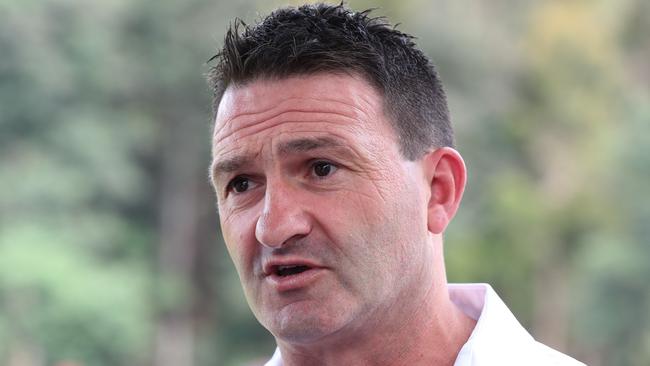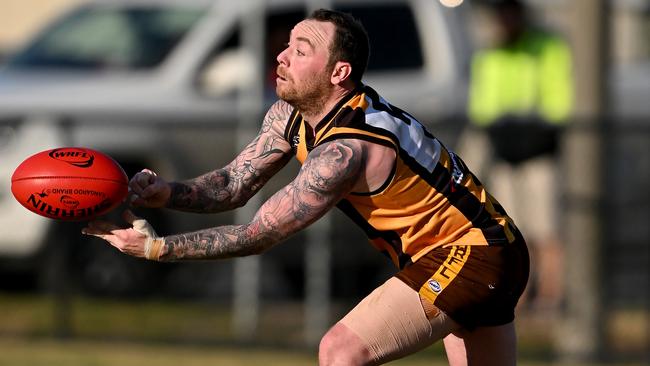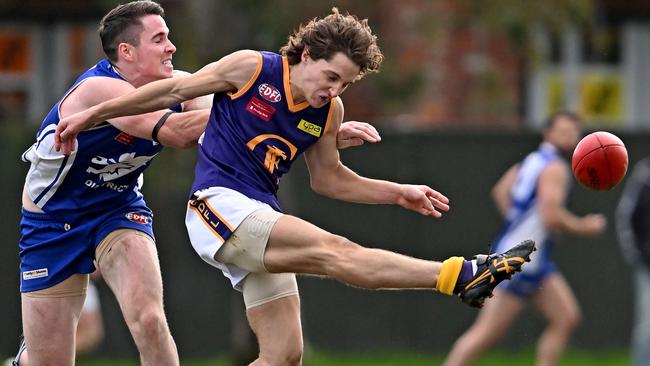AFL reveals local footy salary cap is set to stay
A salary cap in local footy is one of the biggest talking points ahead of every season but it looks set to stay in place for years to come. Here’s why.

Local Footy
Don't miss out on the headlines from Local Footy. Followed categories will be added to My News.
The local footy salary cap might be a running joke among some followers but it will remain to save clubs from themselves.
There have been calls to scrap the cap and tighten player points to ensure equalisation.
However, both mechanisms will continue to be key factors in balancing player payments and club sustainability.
In 2017, metropolitan league salary caps were as high as $250,000 but were slashed across the board, in some cases by more than half, to $100,000 following two Covid-cancelled seasons.
Several country leagues have a $125,000 ceiling.
While critics believe clubs are wilfully evading cap rules, the limit will remain.
AFL general manager of game development, Rob Auld, says one crucial aspect was being overlooked in the conversation.
“I’m committed to the salary cap and player points system … from an equalisation mechanic, player points is a really powerful framework,” he said.
“We’re able to track it through our registrations system PlayHQ and we can monitor it and it’s publicly visible.
“What a lot of people lose track of in this conversation, is the salary cap is not just an equalisation tool, in my view it’s a volunteer-retention tool.
“If you allow a free economy, who is raising that extra money? Who is going to get that extra sponsor, who is running the extra function, who’s selling the extra raffle ticket? It’s the volunteer.
“By having the salary cap then you not only maintain a sustainable economy around player payments but you also take the pressure of the volunteers.
“You get into a mentality of an arms race, which is what it used to be, and it’s the volunteer who suffers because they have to go raise the extra $10,000, $20,000 or $30,000 to maintain the opportunity to recruit and get burnt out.
“It’s also the local sponsors, we need to respect that sponsors want to support their club but also have other commitments.”
Financial strain due to overspending has been at the heart of club collapses pre-Covid.
Salary caps are expected to remain low as leagues continue to recover from the canned 2020 and 2021 seasons.
“I don’t see a future where they need to increase rapidly,” Auld said.
“That's not to say they can’t increase at all but I don’t see the need to increase them rapidly.
“With the cost of living, you've got to understand your environment, and to me, it wouldn’t be the best decision to just open up player payments without any governance.”

Financial stress remain a critical issue in community football with player shortages, changing demographics, and most recently, flood damage pushing several clubs into recess in 2023.
Ovens and Murray club Corowa-Rutherglen is perhaps the most significant club forced to pull out of this season.
Old Mentonians (VAFA), Glen Orden (Western Region), Jacana (Essendon District) and Glen Waverley (Eastern) will not take the field this season.
In country Victoria, Rushworth (Kyabram District) will field a reserve grade team, while Federal (Upper Murray) have gone into recess and Quambatook (Golden Rivers) has shut its doors.
Auld said it was important to understand what was behind each club’s issue.
“Where we’ve seen clubs struggle, I don’t think anyone would suggest there’s a quick fix,” he said.
“We’re working with clubs, in a broader discussion, about what are the participation and population trends are and help them have meaningful discussions about what their future legitimately looks like.
“In some instances that might be, they play with reduced numbers, they may play a reduced number of teams or even contemplate joining with another club – but that’s a longer-term conversation.
“Corowa-Rutherglen’s volunteers, you’ve got to take your hat of to them because they worked so hard to maintain involvement for 2023 but in the end floods, players departed and they weren’t able to appoint a coach until late, and that would have tested the resilience of any footy club.

“They’ve got a strong plan to keep the juniors going and be set up and ready to re-enter the competition in 2024.
“In other instances like Rushworth where the demographics have changed, they’re going to put a single team out and their netballers will still play.
“They’ve had a significant population shift and have an ageing demographic, so that’s where you have a conversation about what the next one, two, ten years look like for their club.”
The AFL is investing heavily in Auskick and school programs, as well as “alternate formats” to foster participation rates and keep community football healthy.
“If you look at the state broadly, the numbers at junior levels are incredibly strong and then youth and seniors is returning to 2019 levels,” Auld said.
“The reality is not all of the growth and positivity is spread across the state.
“I live in the country, it’s just the centre – people just say ’I’ll see you at the footy club’ – it’s the tribalism, the sense of belonging and connection that only footy can deliver.”



